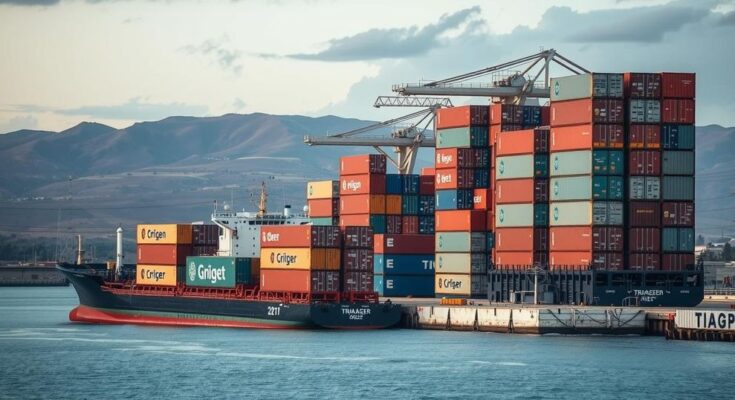In 2024, the Jordanian-Syrian Free Zone facilitated the export of 214,000 tonnes of goods to Syria and Lebanon, marking a 40% increase from 2023. The zone has seen significant investment, especially in the automobile sector, with 90 showrooms now operational. Efficient transaction processing and robust logistical capabilities underscore the zone’s growing importance in regional trade.
In 2024, trade volumes through the Jordanian-Syrian Free Zone experienced a noteworthy increase, with 214,000 tonnes of goods crossing into Syria and Lebanon, up from 150,000 tonnes in the previous year. Irfan Khasawneh, Director of the Free Zone, detailed that goods entering through the Jaber border crossing were stored before being exported via the Nasib crossing into Syrian territories and Lebanon. This increase signifies a 40 percent boost in commercial activity, showcasing a burgeoning interest in the region’s trade opportunities.
Khasawneh further remarked that the Free Zone now supports over 150 investment contracts, particularly noting a heightened interest in the automobile sector recently. There are currently 90 car showrooms operational within the zone, many of which have been authorized for operation after fulfilling their legal and financial responsibilities. Since December 8, a total of 600 Jordanian trucks carrying essential goods, including food supplies and energy devices, have entered Syria, testament to the Free Zone’s capacity to facilitate trade effectively.
The Director emphasized that exchange processes within the Free Zone function efficiently, with no delays in transactions, underscoring the preparedness of the staff to manage various volumes of incoming trucks and goods effectively due to implemented measures. This robust trading framework points to a resilient and expanding economic environment in the Jordanian-Syrian Free Zone, meeting both local and regional demands.
The Jordanian-Syrian Free Zone serves as a pivotal trading hub facilitating the flow of goods into Syria and Lebanon. Established to foster economic collaboration between Jordan and its northern neighbor, this Free Zone has become integral to the regional supply chain, especially post-conflict. Recent data illustrating increased trade volumes highlights not only the capacity of this zone but also the interest from investors looking to capitalize on emerging opportunities in the area, particularly in automotive trade. The strategic importance of this gateway is underscored by efficient operational protocols designed to manage high volumes of transactions and goods.
To summarize, the Jordanian-Syrian Free Zone has demonstrated remarkable growth, with a significant rise in trade volumes reaching 214,000 tonnes in 2024. The increase reflects a broader trend of escalating commercial activity and investment interest, particularly in the automobile sector. The Free Zone’s effective management and operational efficiency enhance its role in supporting the economic landscape of the region, positioning it as a critical logistics and trade point for accessing Syrian and Lebanese markets.
Original Source: www.jordantimes.com




